|
|
|
Sort Order |
|
|
|
Items / Page
|
|
|
|
|
|
|
| Srl | Item |
| 1 |
ID:
104884
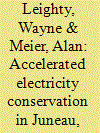

|
|
|
|
|
| Publication |
2011.
|
| Summary/Abstract |
An avalanche destroyed the main hydroelectric transmission line to Juneau, Alaska in April, 2008. Diesel-generated electricity was substituted, causing electricity prices to increase 500% for 45 days. Electricity demand fell by 25% during the supply disruption. Most of the reduction occurred before the higher rates were implemented. Some conservation - about 8% of historic consumption - persisted after the transmission line was repaired and prices returned to normal. Consumers reduced energy use through a combination of new habits and technical improvements. A survey of residential consumers indicated that the average household undertook 10 conservation actions, with major changes in lighting, space heating, fuel switching, and water and appliance use. We propose a method for prioritizing conservation actions for promotion according to their impact in electricity savings (as a function of popularity, effectiveness, and persistence) and a dynamic framework for electricity use before, during, and after a supply disruption (i.e., both the magnitude and rates of change in electricity conservation).
|
|
|
|
|
|
|
|
|
|
|
|
|
|
|
|
| 2 |
ID:
091123
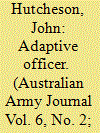

|
|
|
|
|
| Publication |
2009.
|
| Summary/Abstract |
The majority of officers will be working in a multi dimensional and unpredictable operational environment on complex problems that require an integrated inter-agency and/or coalition solution. To assist in developing those solutions officers will need to be more cooperative, compromising and collaborative in order to shape the desired outcome. This desire requires the ability to think critically, communicate effectively, and influence others through persuasive argument. This article seeks to highlight a how Army can develop officers who can think, communicate and influence other non Army people to implement the adaptive Army initiative.
|
|
|
|
|
|
|
|
|
|
|
|
|
|
|
|
| 3 |
ID:
158083
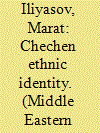

|
|
|
|
|
| Summary/Abstract |
This article critically assesses the ostensible transformation in Chechen ethnic identity. Journalists and scholars who came to this conclusion based their claim on obvious changes in Chechen behavior. The brave and irreconcilable resistance the nation demonstrated during the First and the Second Russo-Chechen Wars of 1994–1996 and 1999–2009, respectively, was replaced by a submissive and loyal stance with regard to the new authorities and recent enemies. This article investigates whether such a change in behavior reflects a corresponding change in ethnic identity. This article asserts that ‘non-Chechen’ behavioral models do not signify changes in Chechen ethnic identity by presenting and analyzing Chechen narratives concerning the question. In summary, this article concludes that the ethnic identity of the nation remained mainly untouched. This conclusion is supported by the observed continuity of Chechen resistance, which has always been driven by cherished values such as freedom.
|
|
|
|
|
|
|
|
|
|
|
|
|
|
|
|
| 4 |
ID:
183084
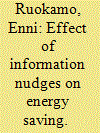

|
|
|
|
|
| Summary/Abstract |
Field experiments have shown that information nudging can help households to save energy, however, the effectiveness varies depending on aspects such as information content, delivery mode and study area. This article evaluates the impacts of information nudges on residential electricity consumption with a randomized field experiment. This opt-in experiment was conducted in Finland. Information was administered via monthly email newsletters and an online energy service platform. The aim is to find out whether i) energy saving tips combined with and without online energy service platform providing electricity consumption information, and ii) peer comparisons (i.e., social norm) influence households’ electricity consumption. The results show a high seasonal variation in the treatment effects within the groups who were registered users of the online energy service platform. Those with access to usage feedback and versatile energy savings tips (without the social norm comparisons) reduced their electricity consumption around 10% in wintertime. The results imply challenges in encouraging energy saving behavior among households less interested in following their electricity consumption.
|
|
|
|
|
|
|
|
|
|
|
|
|
|
|
|
| 5 |
ID:
177485
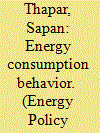

|
|
|
|
|
| Summary/Abstract |
Counted among the top three energy consuming nations globally, India is working towards reducing its carbon emissions. Energy efficiency interventions offers a low-cost opportunity to achieve its climate goals. Though the Indian government has rolled out several energy efficiency schemes, the rate of decrease in energy intensity is lower than expectations. One of the desirable areas for intervention is influencing energy usage in households, which consumes a quarter of the total energy generated in India. The study analyzes energy usage behavior in households, using a mix of primary and secondary techniques. Key findings include seasonal consumption trends correlating with climatic parameters, use of inefficient equipment and rebound effect. Policy prescriptions include peak load clipping techniques like weatherization of homes, display of real-time consumption, rationalization of tariffs and expanded criteria for selecting equipment under ‘Star Rating Scheme’. The findings may be considered to improve energy policies towards influencing consumer behavior in India.
|
|
|
|
|
|
|
|
|
|
|
|
|
|
|
|
| 6 |
ID:
175911
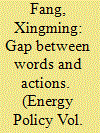

|
|
|
|
|
| Summary/Abstract |
With the increasing concern about energy sustainable policies, the words (willingness) and actions (behavior) of residents to support the renewable energy development have attracted lots of attention. However, most current studies focused on the willingness or behavior separately, ignoring the consistency between them. Given the wide gap between consumers' actual behavior and their willingness to support renewable energy found by a national energy survey in 2016, this paper aims to empirically explore the factors influencing the consistency between the willingness and behavior of Chinese residents through a bivariate-probit model. The empirical results indicate that socio-economic factors, socio-demographic factors and subjective factors have significant influences on residents’ consistency to support renewable energy development. Among them, subjective factors play the most important role. When the full sample is divided into a rural group and an urban group, it shows that income, education and energy supply satisfaction have more impacts on rural residents, while environmental concern and carbon emission knowledge affect urban residents by a larger magnitude. This paper provides important policy implications on how to guide residents willing to support renewable energy to take real actions in their life.
|
|
|
|
|
|
|
|
|
|
|
|
|
|
|
|
| 7 |
ID:
162928
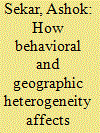

|
|
|
|
|
| Summary/Abstract |
The economic and environmental benefits of efficiency are typically assessed assuming that all consumers use appliances in the same way. There are, however, significant differences in consumer usage patterns, as well as geographical variability in prices and environmental impacts of electricity. To explore the importance of heterogeneity, we first develop distributions of consumer-by-consumer economic benefits from purchasing an efficient versus standard appliance for televisions, clothes washers, and dryers in the U.S. We find large variability, e.g. for washers and dryers, 9% and 7.5% of the U.S. population do not save money over the lifetime of an efficient device, while 11% and 17% save more than twice that of an average consumer. Providing personalized savings information can thus inform and better motivate those consumers who would save more. Abatement costs for carbon and electricity use are similarly heterogenous as consumer economic benefits, indicating that adoption by heavy users is in the public as well as private interest. The cost of abating carbon via a utility appliance rebate program varies greatly by consumer. To scope the emission benefits of targeted adoption, we find that adoption by heavy users saves around 3 times more carbon than an average user for 10% participation in an efficiency program.
|
|
|
|
|
|
|
|
|
|
|
|
|
|
|
|
| 8 |
ID:
098445
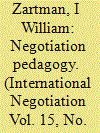

|
|
|
|
|
| Publication |
2010.
|
| Summary/Abstract |
Negotiation is less taught than might be expected in International Relations (IR) programs. Yet an upper-level university course is needed to address three audiences: future citizens, diplomats, and scholars. Since there is no single theory of negotiations, such a course needs to address the various conceptual approaches, grouped as Behavioral, Processual, Integrative, Structural, and Strategic. Conceptual presentations need to be supplemented with practitioners' testimonies, simulations, and case studies, the latter using participants' accounts as well as analyses. Games and a sample syllabus are presented.
|
|
|
|
|
|
|
|
|
|
|
|
|
|
|
|
| 9 |
ID:
108870
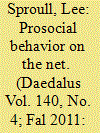

|
|
|
|
|
| Publication |
2011.
|
| Summary/Abstract |
Volunteers and charitable organizations contribute significantly to community welfare through their prosocial behavior: that is, discretionary behavior such as assisting, comforting, sharing, and cooperating intended to help worthy beneficiaries. This essay focuses on prosocial behavior on the Internet. It describes how offline charitable organizations are using the Net to become more efficient and effective. It also considers entirely new models of Net-based volunteer behavior directed at creating socially beneficial information goods and services. After exploring the scope and diversity of online prosocial behavior, the essay focuses on ways to encourage this kind of behavior through appropriate task and social structures, motivational signals, and trust indicators. It concludes by asking how local offline communities ultimately could be diminished or strengthened as prosocial behavior increases online.
|
|
|
|
|
|
|
|
|
|
|
|
|
|
|
|
|
|
|
|
|